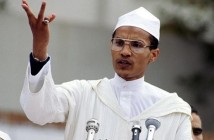Rabat: The Moroccan government will sell part of its 30 percent stake in Maroc Telecom after a spending push to calm street protests eroded its public finances and raised concern over its ability to fund key projects.
A source familiar with the plan told Reuters on Friday the government had revived plans to sell part of its stake.
The Finance and Economy Ministry said on Monday it will sell up to 7 percent of Maroc Telecom’s capital, or 61.53 million shares. French Vivendi holds a 53 percent stake in the firm, the country’s biggest telecom company.
The ministry did not say when the transaction would be completed but market sources in Casablanca said it would be before the end of the fourth quarter of 2011.
The stake is worth 8.86 billion dirhams ($1.1 billion) based on Maroc Telecom’s closing stock price on Friday.
“The receipts will most likely be directed to investment funds run by the state,” said a Casablanca-based fund manager who asked not to be named because his merchant bank plans to bid to advise the ministry on the sale.
At 144 dirhams a share, Maroc Telecom trades at 13.4 times its forecast 2011 earnings, but even though the firm has no debt, its growth prospects are relatively modest, the manager said.
“It’s an expensive stock: The firm expects its EBITDA to rise 1-2 percent this year, so the growth potential is not quite there. The market will expect the government to offer a discount on Friday’s closing price,” the manager said.
Maroc Telecom has subsidiaries in Mauritania, Burkina Faso, Gabon and Mali, but Morocco is its main source of profit. “Competition in Morocco is very tough, the regulator here is all over telecom companies,” added the manager.
If completed in 2011, the transaction will be the third asset sale by the government this year.
It raised 5.3 billion dirhams from the impromptu sale in May of a stake in Banque Centrale Populaire and on Friday cashed in 655 million dirhams from the sale of a salt firm to local Delta Holding .
Proceeds from the operations went straight to replenish state funds after pro-democracy protests and a surge in strikes forced the government to deliver billions of dollars in handouts to avert any spillover from revolts in other Arab countries.
The handouts included wage hikes for public sector employees, the army and paramilitary forces, higher pensions for former public sector workers and increases in the resources of a fund that subsidizes food and energy goods.
Morocco was already strapped for cash to tackle an unemployment rate nearing 33 percent among youths and to fund ambitious projects, including one of the world’s biggest solar energy schemes.
A month after the public wage increase took effect, the budget deficit stood at 17.8 billion dirhams by the end of May, little changed from a year earlier, but up 32 percent from April 2011, central bank data showed.






